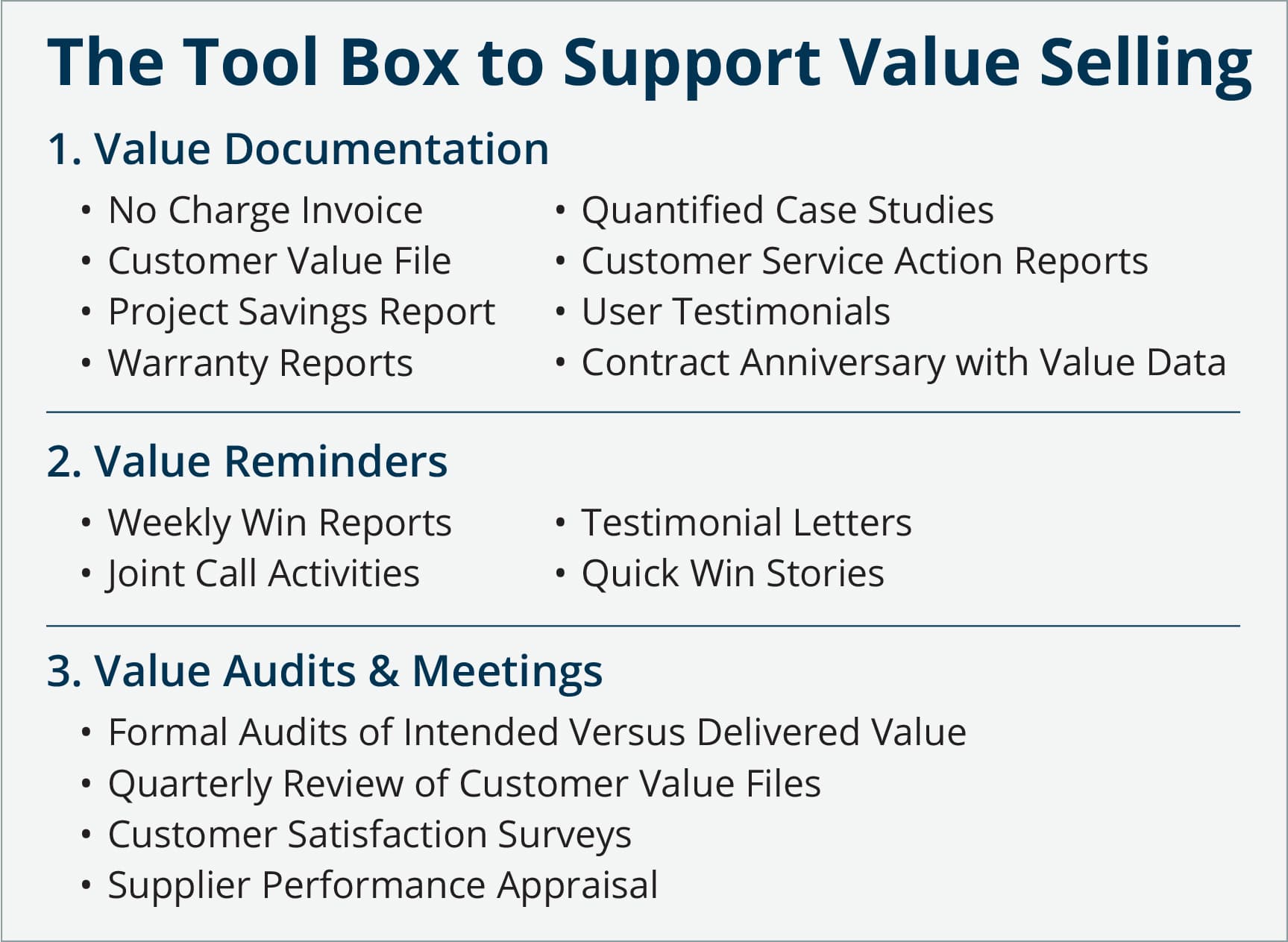Value Realization: Making the Shift From Manual to Automated

Having been in the value management space for many years, our team finds that often, companies set off on their value realization journeys without ever getting into concrete, credible, and compelling outcomes. They project value messages that are not fully quantified or that are partially documented.
Generally, the entire realization journey begins on the coattails of a value-selling initiative and as a result, are using traditional, homegrown or spreadsheets that were leveraged in support of the value-selling process. These tools help with the documentation of customer value, the reminders that value is being tracked, and the manual management of all the data input with customers.
Below are some of the most common tools in the value-selling toolbox:

There are many issues that arise from doing value realization manually:
- Lack of consistency: When done manually, there is often lots of variation in what is calculated, how it is calculated, how it is communicated, and how it is presented to customers. This leads to inconsistencies and human errors across the board.
Additionally, there are issues with accuracy, version control, cybersecurity, and quality. Spreadsheets are good to help get you started, but you need to think about automating them to ensure that all the value you’re delivering can be recognized. - Lack of professionalism, credibility, and impact: Customers expect stable, consistent, and relevant engagement. They cannot be on the receiving end of an unstructured and unprofessional customer success process. They want to see robust analyses with a credible impact that can be shared internally with other stakeholders.
- Time-consuming: Doing things manually takes time and effort from both the vendor and customer teams. You want your sellers selling – not filling out value realization reports to enable value conversations. Similarly, you want your customers to focus on adoption and critical initiatives and not dig up information for your reports.
- Multiple systems to maintain & various data sources: Because manual processes are not integrated into your tech stack, without an automated process, you’ll have to go to a dozen different data sources to find relevant information to build solid value realization reports.
- Chasing data from internal stakeholders: Similarly, the lack of connection to internal systems will cost you hours in meetings and discussions about relevant reports, where to find them, how to read them, and how to interpret them. All this time spent chasing data takes time away from the conversations that truly matter – the value you’re delivering to your customers!
- Value conversations are one-sided: Because of the time it takes to create supporting value-selling documents manually, you have to sacrifice some of the required customer interactions. Manual work is often one-sided and internally focused due to a lack of time, resources, and access to your customer’s internal data. The end result is a lack of customer orientation in the reporting.
- Poorly packaged and communicated reports: As hard as teams may try their best to use the most updated branded materials available, it doesn’t always happen and you get in trouble with the “brand police”! When value realization is not systematic and automated with embedded templates and consistent messaging, you are opening the door to poorly branded reports or underwhelming documents shared with customers. There goes your customer experience!
The conclusion is simple: if you want to scale conversations around business outcomes and company-wide value realization initiatives, you cannot do this in a fragmented and manual manner. Companies that lean in and leverage technology and automation are the only ones who will be able to fully scale value realization conversations.
In the next blog, we will discuss how technology can help and how good integration can help with speed and scale.
Continue learning about Value Realization:
Bio

Dr. Stephan Liozu (www.stephanliozu.com) is the Founder of Value Innoruption Advisors (www.valueinnoruption.com), a consulting boutique specializing in industrial pricing, digital business, and value models, and value-based pricing. Stephan has 30 years of experience in the industrial and manufacturing sectors with companies like Owens Corning, Saint-Gobain, Freudenberg, and Thales. He holds a Ph.D. In Management from Case Western Reserve University, and has written several books, including Dollarizing Differentiation Value (2016) and Value Mindset (2017).

 ValueCloud
ValueCloud
.png?width=118&height=76&name=Rectangle%20(3).png) ValueCloud Ignite
ValueCloud Ignite
.png?width=92&height=92&name=Rectangle%20(4).png) Free Assessment
Free Assessment
.png?width=100&height=100&name=Rectangle%20(5).png) Watch a Demo
Watch a Demo
.png?width=82&height=96&name=Rectangle%20(6).png) Value Calculator
Value Calculator

.png?width=62&height=51&name=Group%2010%20(1).png) Marketing
Marketing
 Sales
Sales
 Customer Success
Customer Success
 Engage Prospects
Engage Prospects
 Win Deals Faster
Win Deals Faster
 Retain Customers
Retain Customers
.png?width=62&height=62&name=Rectangle%20(8).png) Adopt and Scale
Adopt and Scale
.png?width=54&height=54&name=Rectangle%20(9).png) Cybersecurity
Cybersecurity
 Healthcare
Healthcare
.png?width=54&height=54&name=Rectangle%20(10).png) IT & Software
IT & Software





